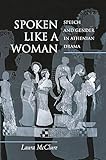Spoken Like a Woman : Speech and Gender in Athenian Drama / Laura McClure.
Material type: TextPublisher: Princeton, NJ : Princeton University Press, [2021]Copyright date: ©1999Description: 1 online resource (336 p.)Content type:
TextPublisher: Princeton, NJ : Princeton University Press, [2021]Copyright date: ©1999Description: 1 online resource (336 p.)Content type: - 9781400832446
- PERFORMING ARTS / Theater / History & Criticism
- Adonia
- Areopagus
- Assembly
- Bacchylides
- Baubo
- Boulē
- Cimon
- Cleisthenes
- Cleomedes
- Demeter
- Demosthenes
- Diodorus Siculus
- Hesiod
- Homeric Hymn to Aphrodite
- Lysias
- Nicias
- Nossis
- Pharmaka
- Rayor, D
- Rothwell, K
- Sappho
- Sophocles
- Thelgein
- Theognis
- Thesmophoria
- Verbal genres: defined
- actors
- aischrologia
- arrhēta
- courtesans
- curse tablets
- demagogues
- dokimasia
- doxa
- epitaphios
- female choruses
- gossip
- gynaecocracy
- invective against women
- isonomia
- isēgoria
- kokuō
- kosmēsis
- kurios
- lamentation
- law courts
- obscenity
- ololugē
- parrhēsia
- partheneion
- persuasion
- prostitution
- rhetoric
- wedding ritual
- women: adultery of
- online - DeGruyter
| Item type | Current library | Call number | URL | Status | Notes | Barcode | |
|---|---|---|---|---|---|---|---|
 eBook
eBook
|
Biblioteca "Angelicum" Pont. Univ. S.Tommaso d'Aquino Nuvola online | online - DeGruyter (Browse shelf(Opens below)) | Online access | Not for loan (Accesso limitato) | Accesso per gli utenti autorizzati / Access for authorized users | (dgr)9781400832446 |
Frontmatter -- CONTENTS -- ACKNOWLEDGMENTS -- NOTE ON ABBREVIATIONS -- CHAPTER ONE. The City of Words: Speech in the Athenian Polis -- CHAPTER TWO. Gender and Verbal Genres in Ancient Greece -- CHAPTER THREE. Logos Gunaikos: Speech and Gender in Aeschylus' Oresteia -- CHAPTER FOUR. At the House Door: Phaedra and the Politics of Reputation -- CHAPTER FIVE. Women's Wordy Strife: Gossip and Invective in Euripides' Andromache -- CHAPTER SIX. Obscenity, Gender, and Social Status in Aristophanes' Thesmophoriazusae and Ecclesiazusae -- CHAPTER SEVEN. Conclusion -- BIBLIOGRAPHY -- INDEX
restricted access online access with authorization star
http://purl.org/coar/access_right/c_16ec
In ancient Athens, where freedom of speech derived from the power of male citizenship, women's voices were seldom heard in public. Female speech was more often represented in theatrical productions through women characters written and enacted by men. In Spoken Like a Woman, the first book-length study of women's speech in classical drama, Laura McClure explores the discursive practices attributed to women of fifth-century b.c. Greece and to what extent these representations reflected a larger reality. Examining tragedies and comedies by a variety of authors, she illustrates how the dramatic poets exploited speech conventions among both women and men to construct characters and to convey urgent social and political issues.From gossip to seductive persuasion, women's verbal strategies in the theater potentially subverted social and political hierarchy, McClure argues, whether the women characters were overtly or covertly duplicitous, in pursuit of adultery, or imitating male orators. Such characterization helped justify the regulation of women's speech in the democratic polis. The fact that women's verbal strategies were also used to portray male transvestites and manipulators, however, suggests that a greater threat of subversion lay among the spectators' own ranks, among men of uncertain birth and unscrupulous intent, such as demagogues skilled in the art of persuasion. Traditionally viewed as outsiders with ambiguous loyalties, deceitful and tireless in their pursuit of eros, women provided the dramatic poets with a vehicle for illustrating the dangerous consequences of political power placed in the wrong hands.
Mode of access: Internet via World Wide Web.
In English.
Description based on online resource; title from PDF title page (publisher's Web site, viewed 30. Aug 2021)


